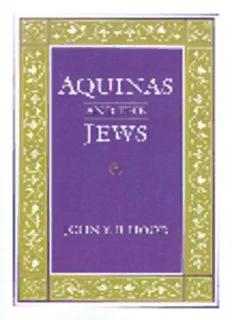
Aquinas and the Jews PDF
Preview Aquinas and the Jews
Aquinas and the Jews University of Pennsylvania Press MIDDLE AGES SERIES Edited by Edward Peters Henry Charles Lea Professor of Medieval History University of Pennsylvania A listing of the available books in the series appears at the back of this volume Aquinas and the Jews JohnY. B. Hood University of Pennsylvania Press Philadelphia Copyright © 1995 by the University of Pennsylvania Press All rights reserved Printed in the United States of America Library of Congress Cataloging-in-Publication Data Hood, John Y. B., 1962- Aquinas and the Jews / John Y.B. Hood, p. cm. — (Middle Ages series) Includes bibliographical references and index. ISBN 0-8122-3305-0. — ISBN 0-8122-1523-0 (pbk.) i. Judaism—Relations—Christianity. 2. Christianity and other religions—Judaism. 3. Christianity and antisemitism—History. 4. Thomas, Aquinas, Saint, 1225?—1274—Views on Judaism. 5. Judaism (Christian theology)—History of doctrines—Middle Ages, 600—1500. I. Title. II. Scries. BM535.H63 1995 26l.2'6'092 dc20 95-5296 CIP ForDebm This page intentionally left blank Contents Introduction ix 1. The Theological Tradition I 2. The Thirteenth-Century Context 19 3. People of the Promises, People of the Law 38 4. Gravissimum Peccatum: The Crucifixion of Christ and the Guilt of the Jews 62 5. The Jews in Christian Society 77 6. Aquinas and the Persecution of European Jews 106 List of Abbreviations 113 Notes 115 Bibliography 137 Index 141 This page intentionally left blank Introduction In 1965, the Catholic Church revised its traditional teaching on the Jews and their place in history. In their "Declaration on the Relation of the Church to Non-Christian Religions" (Nostm Aetate) the bishops of the Second Vatican Council rejected the idea that all Jews were guilty of the Crucifixion of Jesus, declared persecution of Jews to be immoral, and informed cate- chists and other religious educators that "the Jews should not be spoken of as rejected or accursed."1 These statements were brief and undramatic; the section on Jews in Nostm Aetate is only two pages long. The bishops did not overtly acknowledge that they were altering traditional doctrine, nor did they strike a penitential note. When the decree was promulgated, however, it was immediately recognized that the Church had repudiated more than fifteen hundred years of theory and practice. Prior to Vatican II, no theologian was more closely identified with traditional Catholic teaching than Saint Thomas Aquinas (1224—1274). A controversial figure during his lifetime, Aquinas was accepted as the official philosopher of the Dominican Order within a generation of his death, and by the end of the Middle Ages he had eclipsed such rivals as Duns Sco- tus to become the Church's most influential theologian. At the Council of Trent his Summa Theologiae lay on the altar next to the Bible. Over the next three centuries, Aquinas's popularity waxed and waned, and the Church did not follow his teaching on every issue (the doctrine of the Immacu- late Conception, which was promulgated by Pope Pius IX in 1854, despite the fact that Thomas had denied it, is a case in point), but his theologi- cal method and many of his substantive ideas remained regnant. His star shone even more brightly after 1879, when Pope Leo XIII promulgated the encyclical Aeterni Pcitris, which lavished praise on Aquinas and called for a greater emphasis on the Angelic Doctor's teaching. Catholic philosophers, theologians, and historians enthusiastically responded to Leo's challenge and made the period from 1880 to 1960 a golden age of Thomism. Aqui- nas became virtually the Church's official philosopher and theologian, and countless books, articles, and dissertations were published on every aspect of his thought.
Description: